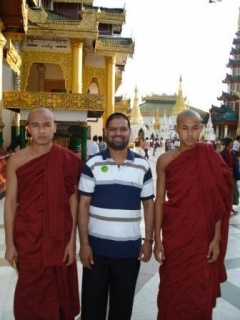Bangkok. Over 40 eminent scholars from all over Asia belonging to different traditions along with a few representatives from Europe and America gathered at Assumption University, Bangkok, on June 4-5, for a Colloquium on the theme “Origins and Destinies of Cultures”. It was an initiative of the FABC Office of Evangelization.
Scholars representing a particular tradition spoke about the key concepts and values that gave rise to their culture/civilization (Confucian, Buddhist, Syriac, Japanese, Korean, Filippino, Muslim, Vaishanavite Hindu). Indigenous cultures of minority communities in Asia also were given attention. Dr. Warayuth Sriwarakuel, the head of the Department of Philosophy at the Assumption University said that the Thais were originally animists, but benefitted from the concepts and values of both Hinduism and Buddhism. Christianity too has made its contribution during modern times.
The main aim of the colloquium was to identify the original spark that gave birth to each one’s tradition and present it in a creative way to the participants. It meant trying to describe the inner genius of every community/society, reflecting on the values and concepts that were the source of its strength and the force that united them with others. Dr. Katrin de Guia from the Philippines showed how “the Filipinos had a strong ‘feeling for the other’”. “This gave amazing sturdiness to the Filipino society”, she asserted.
The scholars also spoke about the dreams that they cherished for the future of their community. In order to ensure a glorious destiny for their people they need to make full use of the positive elements and strengths in their traditions. The scholars proposed a shared destiny for the Asian peoples by inter-relating the best qualities of the diverse cultures and civilizations on the Continent with each other. Dr. Hyondok Choe from Korea said, “if cultural individualities disappear, all that remains will be atomized individuals. Such persons will not have the resources needed to confront the challenges of the future”.
It was truly an inspiring encounter of Asian cultures, each seeking to learn from the valuable assets of the other. The reflections had for their objective to awaken a sense of responsibility to work together for the wellbeing of the human family Dr. Caternia Casarono from Italy cautioned, “There is a strong risk for Asia coming under the domination of unscrupulous multinational companies, which exploit the many unsuspecting submissive workers of Asia…Their rights need to be defended. Their cultural identities need to be protected”.
“Societies develop by learning from each other”, said Archbishop Thomas Menamparampil, the Chairman of the FABC Office of Evangelization. “Unfortunately martial arts travel the fastest, and exploitative trade”. Here is where Asian values for peace and mutual concern must come to help.
Referring to traditional Chinese values, Dr. Ouyang Kang, the Vice President of the prestigious Wuhan University said, “the challenge today is how to integrate traditional Chinese values with the needs of Modern Age”. What is required is a common effort.
Dr. Glen Chatalier, the Director of the Office of International Affairs of the Assumption University, spoke at length about the value system that the present king of Thailand was trying to teach through the formulation of his “Tossapit Rajatham”. He quoted the wise saying of Buddha “Happiness is not possible without leading a pure life based on moral and spiritual principles”.
“The cultural identities of various communities around the world are in crisis”, said Dr. Ahmad Fachruddin from Indonesia. “Religious leaders should be the source of inspiration in times of need”, he said
Dr. Edward Alam from Lebanon felt that “the Christian thinkers of the Syriac tradition have something very original to contribute to responding to the many of the contemporary challenges in Asia and in the world”.
The Archbishop Thomas referred to historian Christopher Dawson’s statement, “Civilizations and empires forget the clay that made them. Bloated and heavy, they topple into dust….the building grows too high for the foundations”. Even the most advanced society today may need to give attention to such warnings, he said.
Quoting from Niall Ferguson’s recent book Civilization, the prelate said, “What is most striking is the speed of the Roman Empire’s collapse. In just five decades, the population of Rome fell by three-quarters. What one historian called ‘the end of civilization’ came within the span of a single generation” (Ferguson, Penguin Books, 2011).
Fr. Theodore Mascarenhas of the Pontifical Council for Culture, Rome, emphasized the importance of taking note of the ‘harmony’ that exists within a culture. It is the same harmony that helps a society to build healthy relationship with other societies as well. The various races and religious groups in Goa (India) lived in harmony because the various communities sought to see complementarity in each other’s cultures, he said.
The destinies of our own societies are in our hands. We are daily shaping them or misshaping them. It is for Asians themselves to make the right choices. Our destinies are inter-linked. The challenge that remains before the present generation is to put their cultural assets together in order to build a hope-filled future for Asian societies and the rest of the World. It was to this conclusion that the Colloquium pointed.
Fr. Theodore Mascarenhas SFX, with inputs from the FABC (OE).




